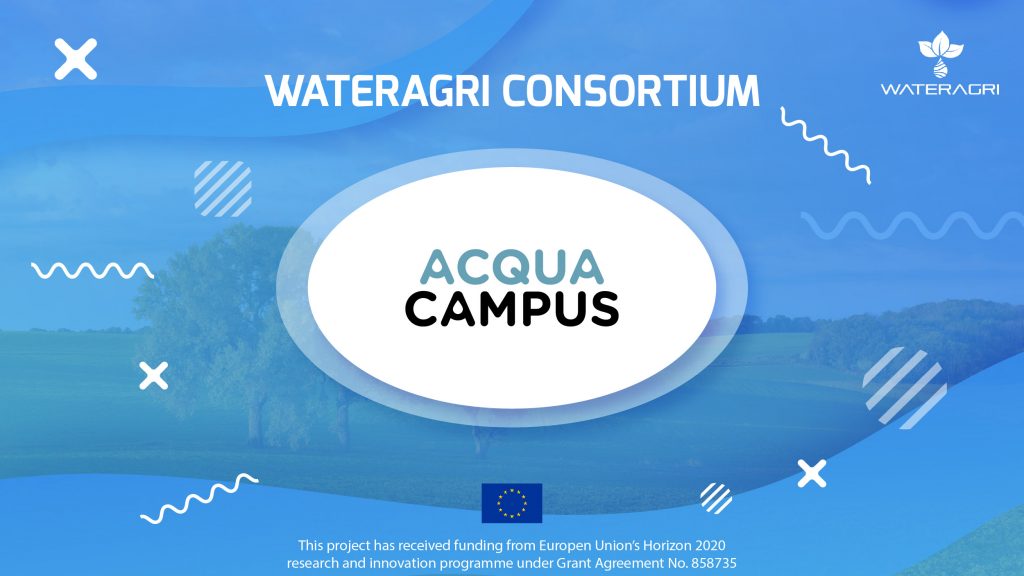CER is at the same time the main local agricultural water stakeholder (Emilia Romagna) and a private institute undertaking research on agricultural water management and governance, offering extension services support to farmers and other water stakeholders. CER is a consortium of consortia involving all agricultural water stakeholders of the region. CER has been carrying out research on water resources since 1959, and on water quality and contamination risk since 1992. We have become involved in various projects financed by the EU since 1990.
CER is involved with the EU farmers’ Association CopaCogeca in EIP water (DG Env.) activities and is taking part in the preparation of the EU Guidelines on water reuse in agriculture and at the EU regulation about the water reuse minimum quality standards. CER extension service provides daily irrigation management to over 11000 farmers and training to of about 2500 students and farmers.
CER is engaged in WP1 as a principal agricultural water stakeholder. CER is involved as well in WP2 providing its experience and know-how concerning water resources management and governance at the farm scale. CER is also involved in WP3 and in WP5 (demonstration case study). CER will contribute to WP4 for what concerns nutrient recovery from streams. The artificial wetland located at the CER experimental station Acqua Campus, and our farm will serve as Italian case study.

Key persons
Adriano Battilani (male). Role: Research. Battilani carries out research on crop water requirements, the circulation and accumulation of fertilisers, plant protection additives and herbicides in soil and water, water reuse and irrigation water quality. He was in charge of pre-normative studies for the reuse of treated wastewater in agriculture and landscape (Emilia Romagna Region) and is engaged in the CIS-ATG Group on Water Reuse and Minimum Quality Standards. Since 1990, he has been involved as Work Package Leader or Scientific Manager in EU projects tackling water/irrigation management and reuse in agriculture. He is the author of more than 240 papers. He was invited as a keynote speaker, appointed as session chairperson and scientific committee member in more than 60 international symposiums and workshops. He was elected chairperson of the “Water Supply-Irrigation” section of the International Society of Horticultural Science for two consecutive terms. He was an appointed member of the European Innovation Partnership on Water (EIP Water) Task Force as representative of the European Farmers’ and Agri-Cooperatives Association (Copa-Cogeca) and the Italian Association of Land and Water Reclamation Board (ANBI). He has been the coordinator of the EIP Water Action Group (AG112) WIRE (Water & Irrigated agriculture Resilient Europe). He is Secretary General of the international association Irrigants d’Europe, grouping the largest association managing water in agriculture. He is a member of the Board of Directors of the Euro-Mediterranean Irrigators Community, which associates represent public and private bodies managing water in agriculture also in North Africa and the Middle East. He is appointed representative of ANBI by the European Water Manager Association – EUWMA. He is currently responsible for 3 EU projects besides national ones and cooperations with PRIMA and H2020 projects as member of the advisory board or as stakeholders’ associations external expert.
Stefano Anconelli (male). Role: Research. He is responsible for the Irrigation Experimentation Agency of the CER since 1998. His main research fields concern the water requirements of orchards, vegetables, biomass and seed crops, development of Crop Water Stress Index Curves (infrared thermometry), the technological tests of micro-irrigation materials and fertigation. Since 1999, he is responsible for many projects on water saving financed by the Emilia Romagna Region. Concerning tree orchards, his expertise includes a response to irrigation, deficit irrigation, regulated deficit irrigation, irrigation scheduling for the fruit quality, water table effects on trees water supply, relationships between irrigation and root system, the technology of drip, sub-surface drip and rain irrigation, anti-frost sprinkler irrigation, irrigation scheme and artificial wetlands. Since 1996, he has been responsible for a research project on phytodepuration for the protection of the wetlands of the Po Delta, financed by the Department of Agriculture for Community Structural Interventions of the Emilia Romagna Region – Objective 5b, aimed at assessing the effects of phyto-purification with macrophytes on the qualitative improvement of wastewater. He was coordinator of the project “On farm phyto depuration of water” financed by Emilia Romagna Region LR28/98. He is also co-author of a book on micro-irrigation and is author of over 80 publications released in the major magazines of agricultural interest and presented at national and international congresses. Stefano is responsible for 8 RDP-FEASR projects.
Roberto Genovesi (male). Role: Research. Since 1986, he is in charge of the Irrigation Extension Service and of the dissemination and demonstration activities on sustainable irrigation at local and national level. His expertise includes the set-up of demonstration fields on irrigation technologies; development of Participatory Irrigation Management (PIM) among Policy Makers and Stakeholders and of day-by-day users management. He developed also the Extension Service Irrigation DSS (IRRINET/IRRIFRAME). He is in charge of the RDP- FEASR project “Paratoie Intelligenti ” aimed to implement smart automation on agricultural water network.
Domenico Solimando (male). Role: Research. Since 2016, he is responsible for the Acqua Campus, the Experimental and Demonstrative Center of the Consortium, where most of the research, experimentation and dissemination activities on water savings in agriculture are carried out.